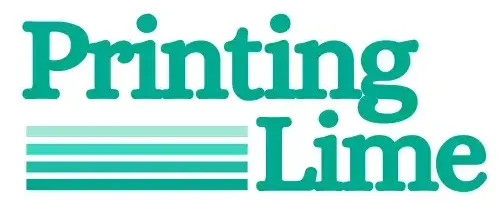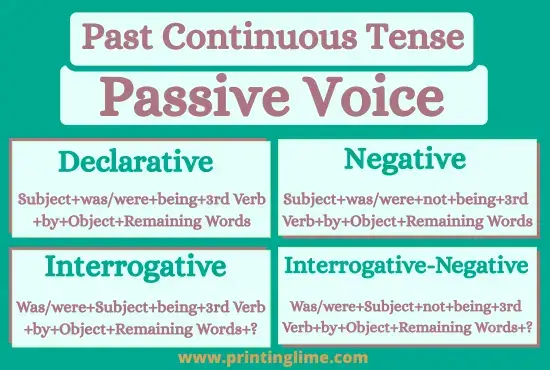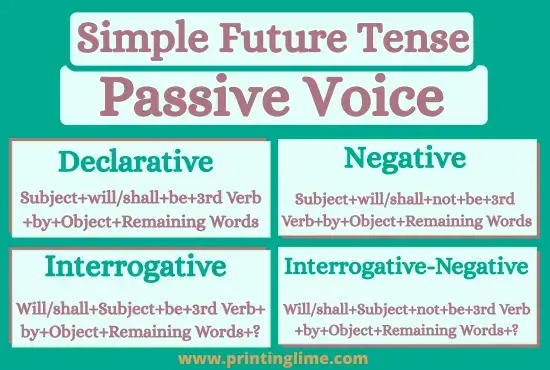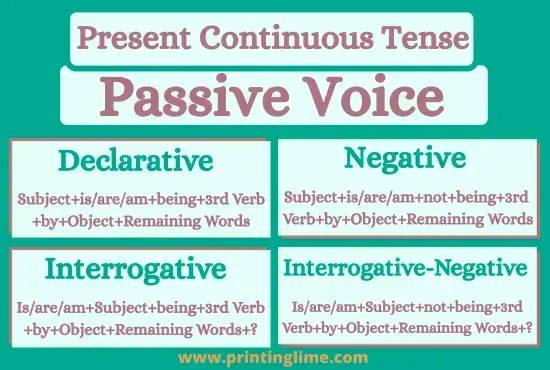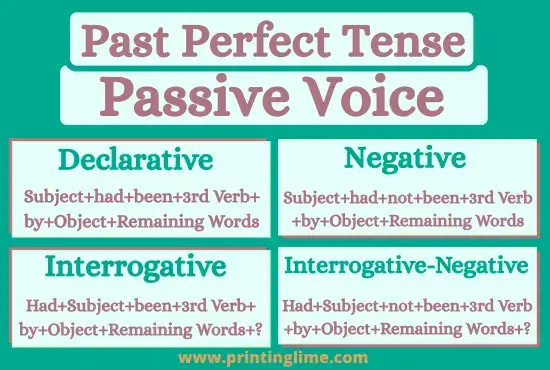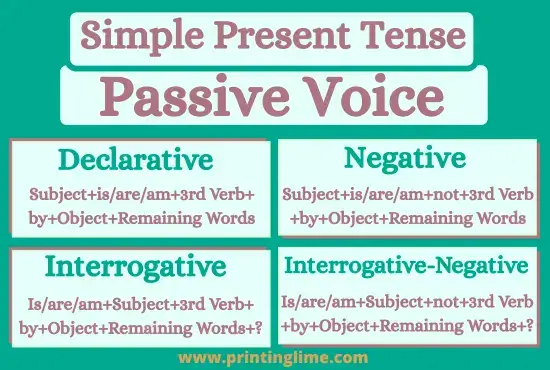Future Perfect Tense (Passive Voice)

Future Perfect Tense (Passive Voice) uses helping verb “will/shall” along with “have been”, to represent the completed actions of the future time. So, Active voice sentences of future habitual actions can convertible to passive voice sentences.
Future Perfect Tense (Passive Voice) Rules
Following are general rules of making Passive Voice Sentences of Future Perfect Tense.
- Firstly, convert the Object of active voice sentences into the Subject of passive voice.
- Then use the helping verb “will have been/shall have been”, according to the Subject of Passive Voice sentences.
- Then, use “3rd Verb”, to indicate that action is in passive state.
- Then, use preposition “by”, to indicate the actual doer ofthe action.
- After this, convert the Subject of the active voice sentence into the object of passive voice sentence.
- At the end, write the remaining words, if there is any inthe active voice sentences.
Helping Verbs of Future Perfect Tense (Passive Voice)
Future Perfect Tense (Passive Voice) uses following 2 helping verbs, with 3rd Verb. This passive tense shows the actions that would be completed during the future time period.
“Will Have Been” As Helping Verb in Future Perfect Tense Passive Voice
“Will have been” is usedas helping verbin Future Perfect Tense(Passive Voice) sentences with all singular and plural nouns and pronouns (You/they/he/she/it), except “I/we”. Thus, these passive voice sentences of future tense have the following sentence structural formula.
You/they/he/she/it/Singular & Plural Noun+ will+ have+ been+ 3rd Verb+ by+ Object+ Remaining Words
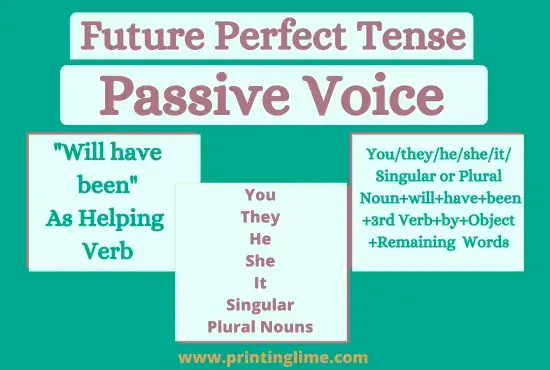
Following are some examples of Future Perfect Tense (Passive Voice) with “will have been” as the helping verb.
- The principal will have awarded him the gold medal.
- He will have been awarded the gold medal by the principal.
- The gold medal will have been awarded to him by the principal.
- The manager will have informed her about the schedule.
- She will have been informed by the manager about the schedule.
- The mechanic will have repaired it before morning.
- It will have been repaired by the mechanic before morning.
- Your teacher will have taught you advanced grammar.
- You will have been taught advanced grammar by your teacher.
- Advanced grammar will have been taught to you by your teacher.
- The instructor will have given them their certificate.
- They will have been given their certificate by the instructor.
- Their certificate will have been given to them by the instructor.
“Shall Have Been” As Helping Verb in Future Perfect Tense Passive Voice
“Shall have been” is used as an helping verb in Future Perfect Tense (Passive Voice) sentences with only 1st person personal pronouns “I/we”. Thus, Future Perfect Tense (PassiveVoice) sentences with “shall have been”, have thefollowing sentencestructural formula.
I/we+ shall+ have+ been+ 3rd Verb+ by+ Object+ Remaining Words
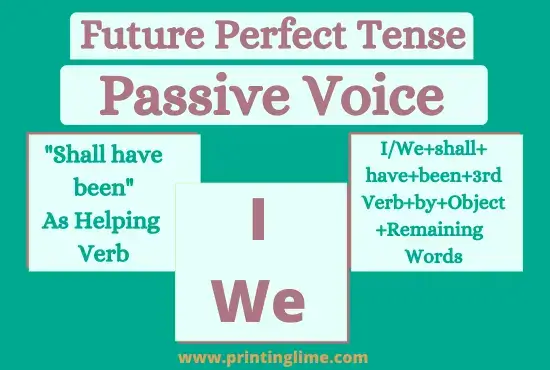
Following are some examples of Future Perfect Tense (Passive Voice) with “shall have been” as helping verb.
- They will have invited me to the conference by next week.
- I shall have been invited by them to the conference by next week.
- The manager shall have informed us about the new policy before Monday.
- We shall have been informed by the manager about the new policy before Monday.
- The company shall have trained me for the new project by December.
- I shall have been trained by the company for the new project by December.
- The teacher shall have given us the final results by tomorrow.
- We shall have been given the final results by the teacher by tomorrow.
- The final results will have been given to us by the teacher bytomorrow.
- The officer shall have provided me with all the necessary documents by that time.
- I shall have been provided with all the necessary documents by the officer by that time.
- The necessary documents will have been provided to me by the officer by that time.
Future Perfect Tense Passive Voice Formula
Following are the general sentence structural formulas for Declarative, Negative, Interrogative, and Interrogative-Negative sentences of Future Perfect Tense (Passive Voice). However, all types of sentences of Future Perfect Tense (Passive Voice) have the following general sentence formula.
Subject+ will/shall+ have+ been+ 3rd Verb+ by+ Object+ Remaining Words
Declarative Sentence Formula of Future Perfect Tense Passive Voice
Declarative or Assertive sentences of Future Perfect Tense (Passive Voice) uses “will have been/shall have been” as helping verbs with respective singular and plural nouns and pronouns. Thus, these sentences have the following sentence formula.
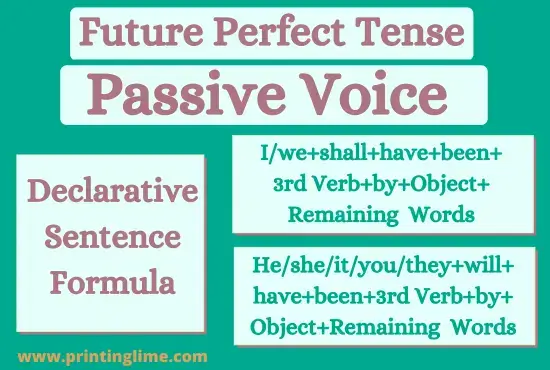
Examples of Declarative Sentences of Future Perfect Tense Passive Voice
Following are some examples of Declarative Sentences of Future Perfect Tense (Passive Voice).
- The manager shall have informed me about the schedule.
- I shall have been informed by the manager about the schedule.
- The principal shall have invited us to the annual function.
- We shall have been invited by the principal to the annual function.
- The instructor will have trained you for the new system.
- You will have been trained by the instructor for the new system.
- The board will have given them the final approval.
- They will have been given the final approval by the board.
- The final approval will have been given to them by the board.
- The university will have awarded him the scholarship.
- He will have been awarded the scholarship by the university.
- The scholarship will have been awarded to him by the university.
- The company will have promoted her to senior manager by next year.
- She will have been promoted to senior manager by the company by the next year.
- The technician will have praised the student for his project.
- The student will have been praised by the technician for his project.
- The teacher will have praised the student for his project.
- The student will have been praised by the teacher for his project.
- The workers will have cleaned the cars before the event.
- The cars will have been cleaned by the workers before the event.
- The assistant will have prepared the documents by noon.
- The documents will have been prepared by the assistant by noon.
Negative Sentence Formula of Future Perfect Tense (Passive Voice)
Negative Sentences of Future Perfect Tense (Passive Voice) have “not” after helping verb “will/shall”, and before “have been”, in order to show the negativity of the future time completed action. Thus, these negative sentences have the following sentence structural formula.
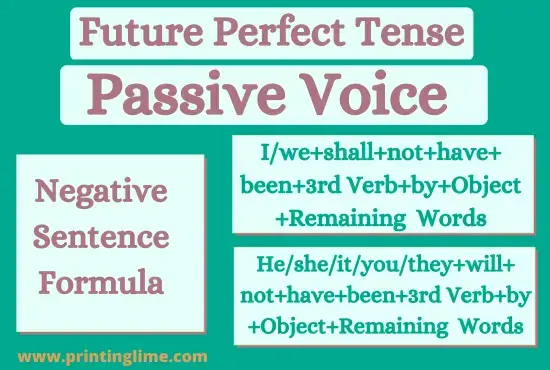
Examples of Negative Sentences of Future Perfect Tense (Passive Voice)
Following are some examples of Negative Sentences of Future Perfect Tense (Passive Voice).
- The manager shall not have invited me to the meeting.
- I shall not have been invited to the meeting by the manager.
- The supervisor shall not have informed us about the changes by tomorrow.
- We shall not have been informed by the supervisor about the changes by tomorrow.
- The teacher will not have taught you the new lesson.
- You will not have been taught the new lesson by the teacher.
- The new lesson will not have been taught to you by the teacher.
- The examiner will not have given them the results.
- They will not have been given the results by the examiner.
- The results will not have been given to them by the examiner.
- The committee will not have awarded him the prize.
- He will not have been awarded the prize by the committee.
- The prize will not have been awarded to him by the committee.
- The director will not have informed her of the final decision.
- She will not have been informed by the director of the final decision.
- The final decision will not have been informed to her by the director.
- The mechanic will not have repaired it by evening.
- It will not have been repaired by the mechanic by evening.
- The company will not have published the book.
- The book will not have been published by the company.
- The headmaster will not have given the students their certificates by next week.
- The students will not have been given their certificates by the headmaster by next week.
- Their certificates will not have been given to the students by the headmaster by next week.
- The engineers will not have installed the machines before the deadline.
- The machines will not have been installed by the engineers before the deadline.
Interrogative Sentence Formula of Future Perfect Tense (Passive Voice)
Interrogative Sentences of Future PerfectTense (Passive Voice) uses “will/shall” at the start of the sentence to show the questionability about the completed actions that would be completed during future time period. So, these interrogative sentences have the following general sentence formula.
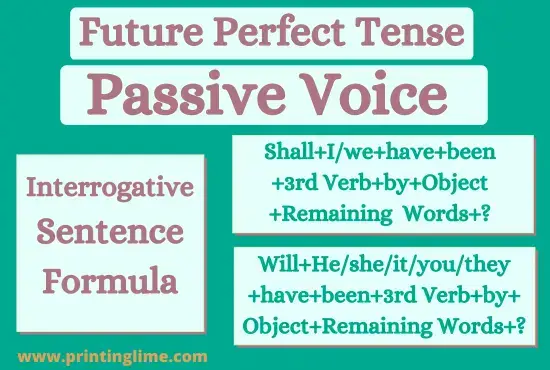
Examples of Interrogative Sentences of Future Perfect Tense (Passive Voice)
Following are some examples of Interrogative Sentences of Future Perfect Tense (Passive Voice).
- Shall the teacher have informed me about the results?
- Shall I have been informed about the results by the teacher?
- Shall the director have invited us to the ceremony?
- Shall we have been invited to the ceremony by the director?
- Will the manager have trained you for the new role?
- Will you have been trained for the new role by the manager?
- Will the principal have given them the permission?
- Will they have been given the permission by the principal?
- Will the premission have been given to them by the principal?
- Will the committee have awarded him the medal?
- Will he have been awarded the medal by the committee?
- Will the medal have been awarded to him by the committee?
- Will the supervisor have informed her about the delay?
- Will she have been informed about the delay by the supervisor?
- Will the technician have repaired it by tomorrow?
- Will it have been repaired by the technician by tomorrow?
- Will the teacher have praised the student for his effort?
- Will the student have been praised by the teacher for his effort?
- Will the workers have cleaned the cars before the event?
- Will the cars have been cleaned by the workers before the event?
- Will the assistant have prepared the documents before noon?
- Will the documents have been prepared by the assistant before noon?
Interrogative-Negative Sentence Formula of Future Perfect Tense (Passive Voice)
Interrogative-Negative sentences of Future Perfect Tense(Passive Voice) use “will/shall” at the start of sentences, and “not have been” comes after the Subject of passive voice sentences. Thus, these interrogative-negative sentences have the following sentence structural formula.
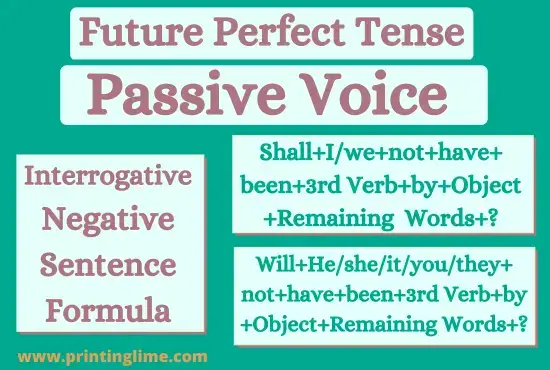
Examples of Interrogative-Negative Sentences of Future Perfect Tense Passive Voice
Following are some examples of Interrogative-Negative Sentences of Future Perfect Tense (Passive Voice).
- Shall the manager not have informed me about the plan?
- Shall I not have been informed about the plan by the manager?
- Shall the principal not have invited us to the function?
- Shall we not have been invited to the function by the principal?
- Will the instructor not have trained you for the project?
- Will you not have been trained for the project by the instructor?
- Will the organization not have given them the opportunity?
- Will they not have been given the opportunity by the organization?
- Will the opportunity not have been given to them by the organization?
- Will the committee not have awarded him the certificate?
- Will he not have been awarded the certificate by the committee?
- Will the certificate not have been awarded to him by the committee?
- Will the director not have informed her of the changes?
- Will she not have been informed of the changes by the director?
- Will the technician not have repaired it by tomorrow?
- Will it not have been repaired by the technician by tomorrow?
- Will the teacher not have praised the student for his work?
- Will the student not have been praised by the teacher for his work?
- Will the workers not have cleaned the cars before the show?
- Will the cars not have been cleaned by the workers before the show?
- Will the clerk not have prepared the documents before the meeting?
- Will the documents not have been prepared by the clerk before the meeting?
